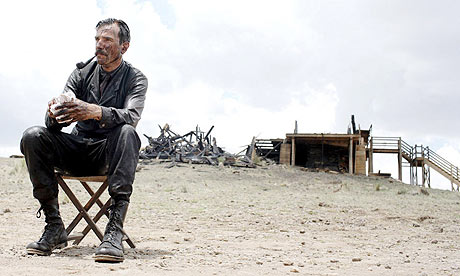
Towards the end of the decade, director Paul Thomas Anderson unburdened himself of this strange and disquieting masterpiece, a mesmeric and utterly distinctive movie, loosely based on Upton Sinclair's 1927 novel Oil! The film was of a higher order of intelligence and innovation than anything he had attempted before, and anything else in noughties Hollywood. It was the story of one tormented man – the lonely and driven oil prospector Daniel Plainview: a magnificent performance from Daniel Day-Lewis whose masterpiece this was, too. He revealed an effortless, seductive technique, almost a sensual pleasure to watch – rivalling and in fact surpassing Olivier in his silver-screen heyday.
There Will Be Blood is a tragic parable of man's dysfunctional dependence upon oil: the once glorious lubricant of commercial triumph and technological innovation, and now the dwindling lifeblood of our material prosperity, the unacknowledged driving force of our military conflicts, and even the cause of a coming ecological catastrophe. That dark title promises or threatens a calamity now visible on the horizon: a destruction of the Earth itself. And it is all inscribed in the story of Plainview and, perhaps even absurdly, painfully etched on his face.
There can hardly be anything in the decade's cinema as grippingly mad as the opening wordless section, in which Jonny Greenwood's atonal score accompanies Plainview fanatically hacking away in the mine. This is the pre-history of oil, and it is a sequence to compare with Kubrick's apes learning to use tools at the beginning of 2001: A Space Odyssey. Finally, at the time of the great crash of 1929, Plainview sits alone in his dark mansion, the lights dimmed, delivering that macabre black-comic aria, boasting that he shall consume every other competitor's oil like sucking up a milkshake: Plainview's resources are running out, like those of the markets and even the Earth itself.
The film appeared to reinvent biographical narrative and epic storytelling. Critics compared it to Welles and Citizen Kane, and the analogy is not so very hubristic. When Plainview melodramatically drives a stake through his claim map in front of his admiring partners, it is a little like Charlie Kane grinningly welcoming the dancing girls at his party. But There Will Be Blood was a claustrophobic, interior epic. Anderson's camera seems always to be tight in to Plainview's clenched face as he consumes, advances and destroys, never taking the smallest pleasure in any of his triumphs, indeed seeing them as the occasions for more resentment and rage.
The noughties have seen a globalised phenomenon of paranoid, theocratic jihad matched with mendacious imperial adventure. The war on terror was what we were all talking about and it filtered into the movies in different ways. But Anderson's compelling movie was a premonition of the one war more terrible still – the one that will come when the fuel runs low and the global temperatures rise. There Will Be Blood was more than a film: it was a prophecy.

